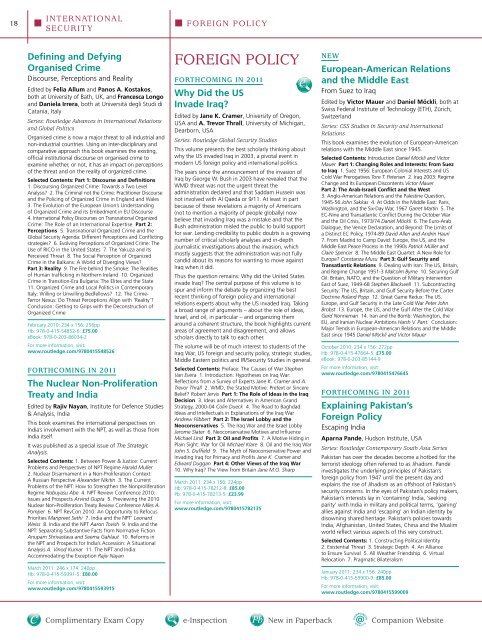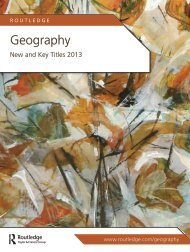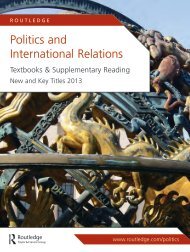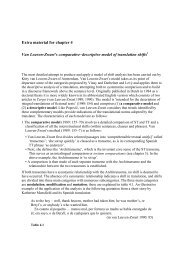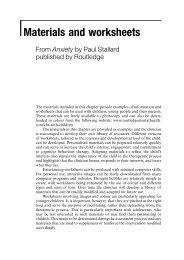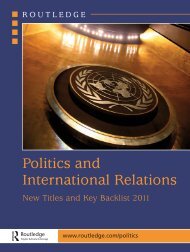Easily na - Routledge
Easily na - Routledge
Easily na - Routledge
Create successful ePaper yourself
Turn your PDF publications into a flip-book with our unique Google optimized e-Paper software.
18<br />
iNTerNaTioNal<br />
seCuriTy<br />
Defining and Defying<br />
Organised Crime<br />
Discourse, Perceptions and Reality<br />
Edited by Felia Allum and Panos A. Kostakos,<br />
both at University of Bath, UK, and Francesca Longo<br />
and Daniela Irrera, both at Università degli Studi di<br />
Catania, Italy<br />
Series: <strong>Routledge</strong> Advances in Inter<strong>na</strong>tio<strong>na</strong>l Relations<br />
and Global Politics<br />
Organised crime is now a major threat to all industrial and<br />
non-industrial countries. Using an inter-discipli<strong>na</strong>ry and<br />
comparative approach this book examines the existing,<br />
official institutio<strong>na</strong>l discourse on organised crime to<br />
examine whether, or not, it has an impact on perceptions<br />
of the threat and on the reality of organized crime.<br />
Selected Contents: Part 1: Discourse and Definitions<br />
1. Discoursing Organized Crime: Towards a Two Level<br />
A<strong>na</strong>lysis? 2. The Crimi<strong>na</strong>l not the Crime: Practitioner Discourse<br />
and the Policing of Organized Crime in England and Wales<br />
3. The Evolution of the European Union’s Understanding<br />
of Organized Crime and its Embedment in EU Discourse<br />
4. Inter<strong>na</strong>tio<strong>na</strong>l Policy Discourses on Trans<strong>na</strong>tio<strong>na</strong>l Organized<br />
Crime: The Role of an Inter<strong>na</strong>tio<strong>na</strong>l Expertise Part 2:<br />
Perceptions 5. Trans<strong>na</strong>tio<strong>na</strong>l Organized Crime and the<br />
Global Security Agenda: Different Perceptions and Conflicting<br />
strategies? 6. Evolving Perceptions of Organized Crime: The<br />
Use of RICO in the United States 7. The Yakuza and its<br />
Perceived Threat 8. The Social Perception of Organized<br />
Crime in the Balkans: A World of Diverging Views?<br />
Part 3: Reality 9. The Fire behind the Smoke: The Realities<br />
of Human trafficking in Northern Ireland 10. Organized<br />
Crime in Transition-Era Bulgaria: The Elites and the State<br />
11. Organized Crime and Local Politics in Contemporary<br />
Italy: Willing or Unwilling Bedfellows? 12. The Crime-<br />
Terror Nexus: Do Threat Perceptions Align with ‘Reality’?<br />
Conclusion: Getting to Grips with the Deconstruction of<br />
Organized Crime<br />
February 2010: 234 x 156: 256pp<br />
Hb: 978-0-415-54852-6: £75.00<br />
eBook: 978-0-203-86034-2<br />
For more information, visit:<br />
www.routledge.com/9780415548526<br />
Forthcoming in 2011<br />
The Nuclear Non-Proliferation<br />
Treaty and India<br />
Edited by Rajiv Nayan, Institute for Defence Studies<br />
& A<strong>na</strong>lysis, India<br />
This book examines the inter<strong>na</strong>tio<strong>na</strong>l perspectives on<br />
India’s involvement with the NPT, as well as those from<br />
India itself.<br />
It was published as a special issue of The Strategic<br />
A<strong>na</strong>lysis.<br />
Selected Contents: 1. Between Power & Justice: Current<br />
Problems and Perspectives of NPT Regime Harald Muller<br />
2. Nuclear Disarmament in a Non-Proliferation Context:<br />
A Russian Perspective Alexander Nikitin 3. The Current<br />
Problems of the NPT: How to Strengthen the Nonproliferation<br />
Regime Nobuyasu Abe 4. NPT Review Conference 2010:<br />
Issues and Prospects Arvind Gupta 5. Previewing the 2010<br />
Nuclear Non-Proliferation Treaty Review Conference Miles A.<br />
Pomper 6. NPT RevCon 2010: An Opportunity to Refocus<br />
Priorities Manpreet Sethi 7. India and the NPT’ Leo<strong>na</strong>rd<br />
Weiss 8. India and the NPT Aaron Tovish 9. India and the<br />
NPT: Separating Substantive Facts from Normative Fiction<br />
Anupam Shrivastava and Seema Gahlaut 10. Reforms in<br />
the NPT and Prospects for India’s Accession: A Situatio<strong>na</strong>l<br />
A<strong>na</strong>lysis A. Vinod Kumar 11. The NPT and India:<br />
Accommodating the Exception Rajiv Nayan<br />
March 2011: 246 x 174: 240pp<br />
Hb: 978-0-415-59391-5: £80.00<br />
For more information, visit:<br />
www.routledge.com/9780415593915<br />
ForeigN PoliCy<br />
ForeigN PoliCy<br />
Forthcoming in 2011<br />
Why Did the US<br />
Invade Iraq?<br />
Edited by Jane K. Cramer, University of Oregon,<br />
USA and A. Trevor Thrall, University of Michigan,<br />
Dearborn, USA<br />
Series: <strong>Routledge</strong> Global Security Studies<br />
This volume presents the best scholarly thinking about<br />
why the US invaded Iraq in 2003, a pivotal event in<br />
modern US foreign policy and inter<strong>na</strong>tio<strong>na</strong>l politics.<br />
The years since the announcement of the invasion of<br />
Iraq by George W. Bush in 2003 have revealed that the<br />
WMD threat was not the urgent threat the<br />
administration declared and that Saddam Hussein was<br />
not involved with Al Qaeda or 9/11. At least in part<br />
because of these revelations a majority of Americans<br />
(not to mention a majority of people globally) now<br />
believe that invading Iraq was a mistake and that the<br />
Bush administration misled the public to build support<br />
for war. Lending credibility to public doubts is a growing<br />
number of critical scholarly a<strong>na</strong>lyses and in-depth<br />
jour<strong>na</strong>listic investigations about the invasion, which<br />
mostly suggests that the administration was not fully<br />
candid about its reasons for wanting to move against<br />
Iraq when it did.<br />
Thus the question remains: Why did the United States<br />
invade Iraq? The central purpose of this volume is to<br />
spur and inform the debate by organizing the best<br />
recent thinking of foreign policy and inter<strong>na</strong>tio<strong>na</strong>l<br />
relations experts about why the US invaded Iraq. Taking<br />
a broad range of arguments – about the role of ideas,<br />
Israel, and oil, in particular – and organizing them<br />
around a coherent structure, the book highlights current<br />
areas of agreement and disagreement, and allows<br />
scholars directly to talk to each other.<br />
The volume will be of much interest to students of the<br />
Iraq War, US foreign and security policy, strategic studies,<br />
Middle Eastern politics and IR/Security Studies in general.<br />
Selected Contents: Preface: The Causes of War Stephen<br />
Van Evera 1. Introduction: Hypotheses on Iraq War:<br />
Reflections from a Survey of Experts Jane K. Cramer and A.<br />
Trevor Thrall 2. WMD, the Stated Motive: Pretext or Sincere<br />
Belief? Robert Jervis Part 1: The Role of Ideas in the Iraq<br />
Decision 3. Ideas and Alter<strong>na</strong>tives in American Grand<br />
Strategy, 2000-04 Colin Dueck 4. The Road to Baghdad:<br />
Ideas and Intellectuals in Expla<strong>na</strong>tions of the Iraq War<br />
Andrew Flibbert Part 2: The Israel Lobby and the<br />
Neoconservatives 5. The Iraq War and the Israel Lobby<br />
Jerome Slater 6. Neoconservative Motives and Influence<br />
Michael Lind Part 3: Oil and Profits 7. A Motive Hiding in<br />
Plain Sight: War for Oil Michael Klare 8. Oil and the Iraq War<br />
John S. Duffield 9. The Myth of Neoconservative Power and<br />
Invading Iraq for Primacy and Profits Jane K. Cramer and<br />
Edward Duggan Part 4: Other Views of the Iraq War<br />
10. Why Iraq? The View from Britain Jane M.O. Sharp<br />
March 2011: 234 x 156: 224pp<br />
Hb: 978-0-415-78212-8: £85.00<br />
Pb: 978-0-415-78213-5: £23.99<br />
For more information, visit:<br />
www.routledge.com/9780415782135<br />
Complimentary exam Copy e-inspection New in Paperback Companion Website<br />
new<br />
European-American Relations<br />
and the Middle East<br />
From Suez to Iraq<br />
Edited by Victor Mauer and Daniel Möckli, both at<br />
Swiss Federal Institute of Technology (ETH), Zürich,<br />
Switzerland<br />
Series: CSS Studies in Security and Inter<strong>na</strong>tio<strong>na</strong>l<br />
Relations<br />
This book examines the evolution of European-American<br />
relations with the Middle East since 1945.<br />
Selected Contents: Introduction Daniel Möckli and Victor<br />
Mauer Part 1: Changing Roles and Interests: From Suez<br />
to Iraq 1. Suez 1956: European Colonial Interests and US<br />
Cold War Prerogatives Tore T. Petersen 2. Iraq 2003: Regime<br />
Change and Its European Discontents Victor Mauer<br />
Part 2: The Arab-Israeli Conflict and the West<br />
3. Anglo-American Relations and the Palestine Question,<br />
1945-56 John Sakkas 4. At Odds in the Middle East: Paris,<br />
Washington, and the Six-Day War, 1967 Garret Martin 5. The<br />
EC-Nine and Transatlantic Conflict During the October War<br />
and the Oil Crisis, 1973/74 Daniel Möckli 6. The Euro-Arab<br />
Dialogue, the Venice Declaration, and Beyond: The Limits of<br />
a Distinct EC Policy, 1974-89 David Allen and Andrin Hauri<br />
7. From Madrid to Camp David: Europe, the US, and the<br />
Middle East Peace Process in the 1990s Patrick Müller and<br />
Claire Spencer 8. The Middle East Quartet: A New Role for<br />
Europe? Constanza Musu Part 3: Gulf Security and<br />
Transatlantic Relations 9. Dealing with Iran: The US, Britain,<br />
and Regime Change 1951-3 Malcolm Byrne 10. Securing Gulf<br />
Oil: Britain, NATO, and the Question of Military Intervention<br />
East of Suez, 1949-68 Stephen Blackwell 11. Subcontracting<br />
Security: The US, Britain, and Gulf Security Before the Carter<br />
Doctrine Roland Popp 12. Great Game Redux: The US,<br />
Europe, and Gulf Security in the Late Cold War Peter John<br />
Brobst 13. Europe, the US, and the Gulf After the Cold War<br />
Gerd Nonneman 14. Iran and the Bomb: Washington, the<br />
EU, and Iranian Nuclear Ambitions Harsh V. Pant. Conclusion:<br />
Major Trends in European-American Relations and the Middle<br />
East since 1945 Daniel Möckli and Victor Mauer<br />
October 2010: 234 x 156: 272pp<br />
Hb: 978-0-415-47664-5: £75.00<br />
eBook: 978-0-203-85144-9<br />
For more information, visit:<br />
www.routledge.com/9780415476645<br />
Forthcoming in 2011<br />
Explaining Pakistan’s<br />
Foreign Policy<br />
Escaping India<br />
Apar<strong>na</strong> Pande, Hudson Institute, USA<br />
Series: <strong>Routledge</strong> Contemporary South Asia Series<br />
Pakistan has over the decades become a hotbed for the<br />
terrorist ideology often referred to as Jihadism. Pande<br />
investigates the underlying principles of Pakistan’s<br />
foreign policy from 1947 until the present day and<br />
explains the rise of Jihadism as an offshoot of Pakistan’s<br />
security concerns. In the eyes of Pakistan’s policy makers,<br />
Pakistan’s interests lay in ‘containing’ India, ‘seeking<br />
parity’ with India in military and political terms, ‘gaining’<br />
allies against India and ‘escaping’ an Indian identity by<br />
disowning shared heritage. Pakistan’s policies towards<br />
India, Afghanistan, United States, Chi<strong>na</strong> and the Muslim<br />
world reflect various aspects of this very construct.<br />
Selected Contents: 1. Constructing Political Identity<br />
2. Existential Threat 3. Strategic Depth 4. An Alliance<br />
to Ensure Survival 5. All Weather Friendship 6. Virtual<br />
Relocation 7. Pragmatic Bilateralism<br />
January 2011: 234 x 156: 240pp<br />
Hb: 978-0-415-59900-9: £85.00<br />
For more information, visit:<br />
www.routledge.com/9780415599009


